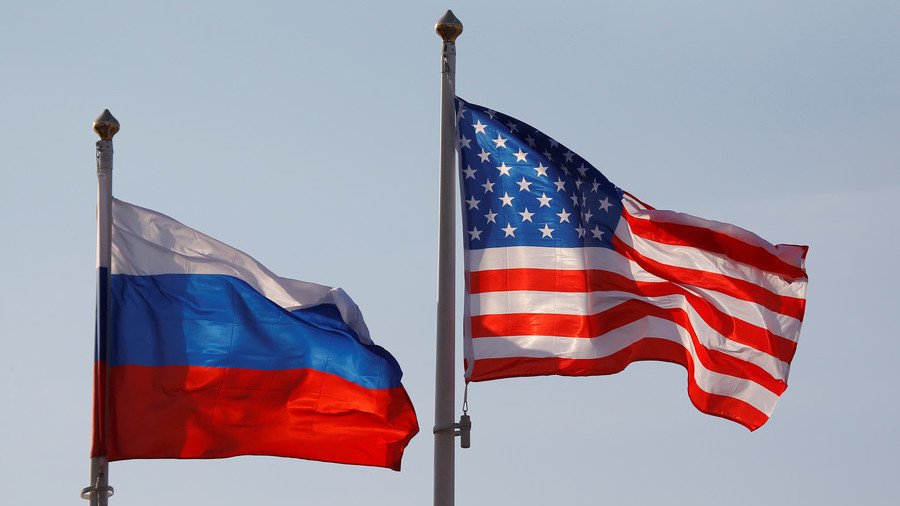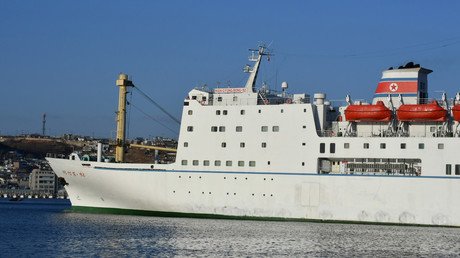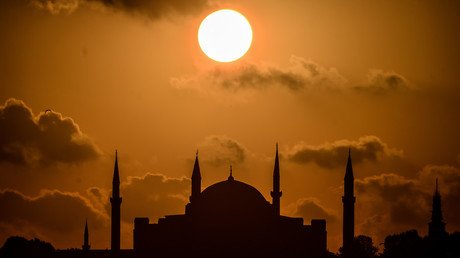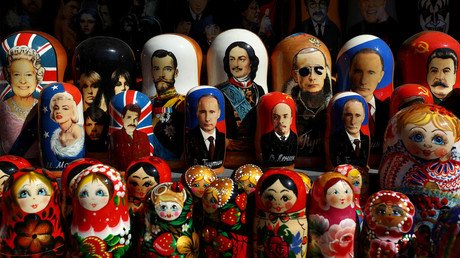Sanction Mania v Russia - by Stephen F. Cohen

For nearly 100 years, Russia has been under US sanctions, often to the detriment of American national security.
Cohen begins by putting the current bipartisan Senate campaign to impose new, "crushing" sanctions on Russia in historical context. Broadly understood, sanctions have been part of US policy toward Russia for much of the past 100 years. During the Russian civil war of 1918–20, President Woodrow Wilson sent American troops to fight against the emerging Soviet government. Though the “Reds” were clearly the established government of Soviet Russia by 1921, Washington continued to deny the USSR diplomatic recognition until President Franklin D. Roosevelt established formal relations in 1933. During much of the 40-year Cold War, the United States imposed various sanctions on its superpower rival, mainly related to technological and military exports, along with periodic expulsions of diplomats and "spies" on both sides.
Congress’ major political contribution was the 1975 Jackson–Vanik Amendment, which denied Moscow privileged trading status with the United States, primarily because of Kremlin restrictions on Jewish emigration from the Soviet Union. Indicative of how mindlessly habitual US sanctions had become, Jackson–Vanik was nullified only in late 2012, long after the end of the Soviet Union and after any restrictions on Jews leaving (or returning to) Russia. Even more indicative, it was immediately replaced, in December 2012, by the Magnitsky Act, which purported to sanction individual Russian officials and "oligarchs" for "human-rights abuses." The Magnitsky Act remains law, supplemented by additional sanctions leveled against Russia as a result of the 2014 Ukrainian crisis and particularly Moscow's annexation of Crimea.
Looking back over this long history, there is no evidence that any US sanctions ever significantly altered Moscow's "behavior" in ways that were intended. Or that they adversely affected Russia's ruling political or financial elites. Any pain inflicted fell on ordinary citizens, who nonetheless rallied "patriotically" around the Kremlin leadership, most recently around Russian President Vladimir Putin. Historically, such sanctions were not problem-solving measures advancing American national security but more akin to temper tantrums or road rage, making things even worse, than to real policymaking.
Why, then, Washington's new bout of sanction mania against Moscow, especially considering the harsh official Russian reaction expressed by Prime Minister Dmitry Medvedev, who called the Senate's proposed measures "a declaration of economic war" and promised that the Kremlin would retaliate?
One explanation is an underlying, astonishing assumption recently stated by Michael McFaul, the media-ubiquitous former US ambassador to Moscow and a longtime Russia scholar: "To advance almost all of our core national security and economic interests, the US does not need Russia." Such a statement by a former or current policymaker and intellectual is perhaps unprecedented in modern times – and manifestly wrong. US "core" interests "need" Russia's cooperation in many vital ways. They include avoiding nuclear war; preventing a new and more dangerous arms race; guarding against the proliferation of weapons and materials of mass destruction; coping with international terrorists (who are in pursuit of such materials); achieving lasting peace in Syria and elsewhere in the Middle East; fostering prosperity and stability in Europe, of which Russia is a part; promoting better relations with the Islamic world, of which Russia is also a part; and avoiding a generation-long confrontation with a formidable new alliance that already includes Russia, China, Iran, and other non-NATO countries. If McFaul's assumption is widespread in Washington, as it seems to be, we are living in truly unwise and perilous times.
A second assumption is no less myopic and dangerous: that the Kremlin is weak and lacks countermeasures to adopt against the new sanctions being advocated in Washington. Consider, however, the following real possibilities. Moscow could sell off its billions of dollars of US Treasury securities and begin trading with friendly nations in non-dollar currencies, both of which it has already begun to do. It could restrict, otherwise undermine, or even shut down many large US corporations long doing profitable business in Russia, among them Citibank, Cisco Systems, Apple, Microsoft, PepsiCo, McDonald's, Johnson & Johnson, Procter & Gamble, Ford Motor Co., and even Boeing. It could end titanium exports to the United States, which are vital to American civilian and military aircraft manufacturers, including Boeing. And terminate the sale of rocket engines essential for NASA and US satellite operations. The world's largest territorial country, Russia could charge US airlines higher tariffs for their regular use of its air space or ban them altogether, making them uncompetitive against other national carriers. Politically, the Kremlin could end its own sanctions on Iran and North Korea, alleviating Washington’s pressure on those governments. And it could end the Russian supply transit to US troops fighting in Afghanistan used since the early 1990s.
None of this seems to have been considered by Washington's sanction zealots. Nor have four other circumstances. Sanctions against Russia's "oligarchs" actually help Putin, whom the US political-media establishment so despises and constantly indicts. For years, he has been trying to persuade many of the richest oligarchs to repatriate their offshore wealth to Russia. Few did so. Now, fearful of having their assets abroad frozen or seized by US measures, more and more are complying. Second, new sanctions limiting Moscow's ability to borrow and finance investment at home will retard the country's still meager growth rate. But the Kremlin coped after the 2014 sanctions and will do so again by turning away even more from the West and toward China and other non-Western partners, and by developing its own capacity to produce sanctioned imports. (Russian agricultural production, for example, has surged in recent years, now becoming a major export industry.) Third, already unhappy with existing economic sanctions against Russia, European multinational corporations - and thus Europe itself - may tilt even farther away from their capricious "transatlantic partner" in Washington, who is diminishing their vast market in the East. And fourth, waging "economic war" is one impulsive step from breaking off all diplomatic relations with Russia, this too actually being discussed by Washington zealots. Such a rupture would turn the clock back many decades, but in an era when there is no "globalization," or international security, without Russia.
Finally, what reason do Washington extreme Cold Warriors themselves give for imposing new sanctions on Russia? Most of them are in the US Senate, historically a body with at least several independent-minded distinguished statesmen, but no longer, with the apparently solitary exception of Rand Paul of Kentucky, who has demonstrated considerable wisdom in regard to US-Russian relations. Their professed reasons are various and nonsensical. Some say Russia must be sanctioned for Ukraine, but those events happened four years ago and have already been "punished." Others say for "Russia's aggression in Syria," but it was Putin's military intervention that destroyed the Islamic State's terrorist occupation of much of the country and ended its threat to take Damascus, to the benefit of America and its allies, including Europe and Israel. Still others insist the Kremlin must be sanctioned for its "nerve agent" attack on Sergei Skripal and his daughter in the UK several months ago. But the British government's case against the Kremlin has virtually fallen apart, as any attentive reader of articles in David Johnson's Russia List will understand.
Ultimately, though, the new bout of sanction mania is in response to Russia's alleged "attack on American democracy" during the 2016 presidential election. In reality, there was no "attack" - no Pearl Harbor, no 9/11, no Russian parachuters descending on Washington - only the kind of "meddling" and "interference" in the other's domestic politics that both countries have practiced, almost ritualistically, for nearly a hundred years. Indeed, whatever "meddling" Russian actors did in 2016 may well have been jaywalking compared to the Clinton administration's massive, highly intrusive political and financial intervention on behalf of the failing Russian President Boris Yeltsin's reelection campaign in 1996.
We are left, then, with the real reason behind the new anti-Russian sanctions effort: to thwart and even punish President Donald Trump for his policy of "cooperation with Russia." And Putin too for having met and cooperated with Trump at their Helsinki summit in July. This bizarre, also unprecedented, reality is more than a whisper. According to a New York Times "news analysis," as well as other published reports, a "bipartisan group of senators, dismayed that Mr. Trump had not publicly confronted Mr. Putin over Russia's election meddling, released draft legislation" of new sanctions against Moscow. "Passage of such a bill would impose some of the most damaging sanctions yet."
Leave aside for now that it is not Russian "meddling" that is delegitimizing our elections but instead these fact-free allegations themselves that are doing so. (How many losing candidates in 2018 will claim their victory was snatched away by Putin?) Consider instead that for doing what every American president since Eisenhower has done – meet with the sitting Kremlin leader in order to avoid stumbling into a war between the nuclear superpowers – in effect both Trump and Putin are being condemned by the Washington establishment, including by members of Trump's own intelligence agencies.
If so, who will avert the prospect of war with Russia, a new Cuban missile–like crisis, conceivably in the Baltic region, Ukraine, or Syria? Certainly not any leading representative of the Democratic Party. Certainly not the current Russophobic "bipartisan" Senate. Certainly not the most influential media outlets, which amplify the warmongering folly almost daily. In this most existential regard, there is for now only, like it or not, President Donald Trump.
Stephen F. Cohen, professor emeritus of Russian studies and politics at NYU and Princeton, and John Batchelor continue their (usually) weekly discussions of the new US-Russian Cold War. Previous installments, now in their fifth year, are at TheNation.com.
Stephen F. Cohen is a professor emeritus of Russian studies and politics at New York University and Princeton University and a contributing editor of The Nation.
This article was originally published by The Nation.
Think your friends would be interested? Share this story!
The statements, views and opinions expressed in this column are solely those of the author and do not necessarily represent those of RT.

















